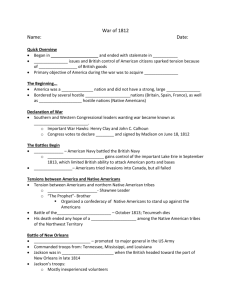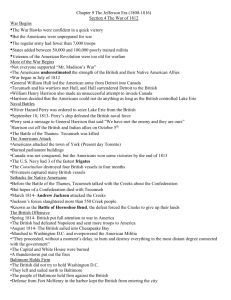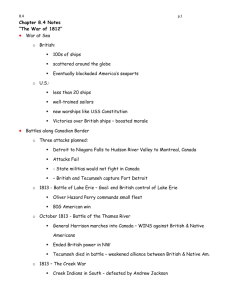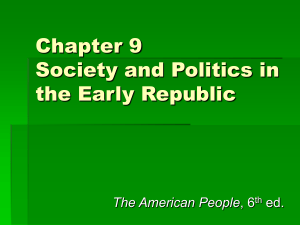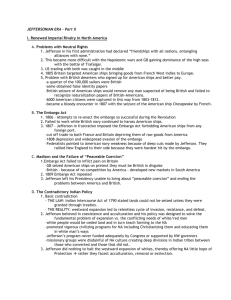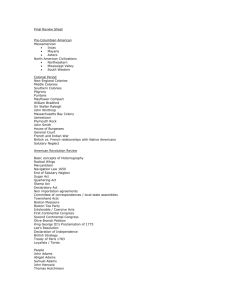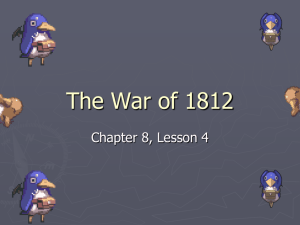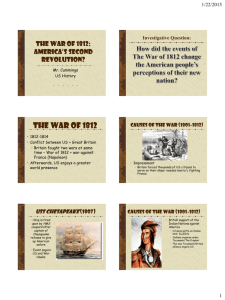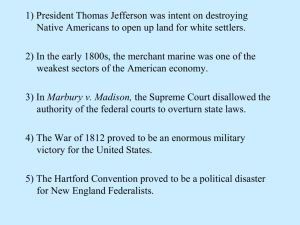The Strengths and Limitations of Jeffersonian
advertisement
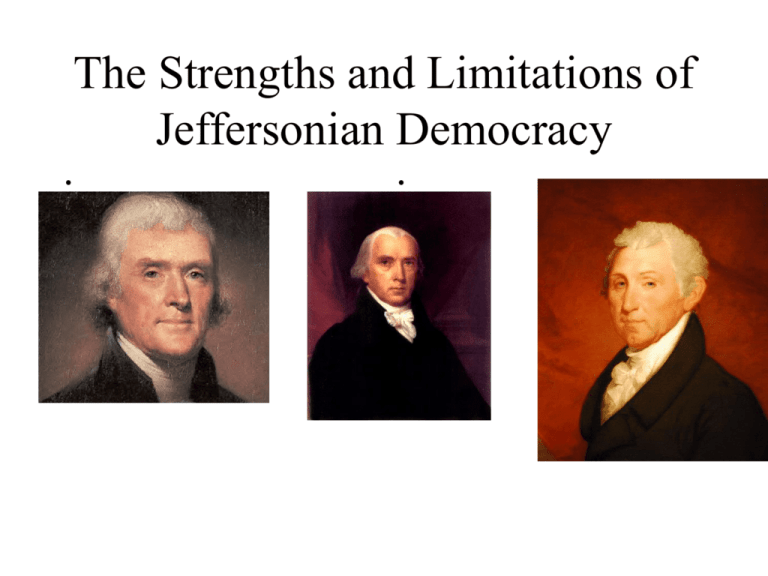
The Strengths and Limitations of Jeffersonian Democracy • • The USA in 1800 Jefferson and the Triumph of Democracy • Jefferson does not retaliate against the Federalists • Jeffersonian Democracy – – Farmer's interests are put first Cities and Industry are nasty, let them rot. Debt Reduction • • • • Slashing the Military down to 3000 people 1800: $83 million 1809: $57 million Land sales are key also Marbury vs. Madison (1803) • • Are last minute appointments by Adams valid? Supreme Court says no but by doing so, it establishes Judicial Review, the power to interpret the Constitution Louisiana Purchase • • Napoleon needs money to fight UK Jefferson buys Louisiana for $15 million – – • This violates his small government claims But it will help farmers, so he doesn't care about ideals. Doubles size of the US The USA in 1803 International Impotence • American ships are seized in European wars • The Chesapeake Incident – – 1807: USS Chesapeake is attacked and captured by the British to seize some of its crew. Jefferson demands apology, British refuse Embargo Act (1807) • • • Closes Sea Trade Until British and French Apologize and Compensate Us They ignore it and New England goes broke Jefferson overestimates US financial influence Tecumseh, Head of the Pan-Indian Confederacy Tecumseh • Organizes alliance against settlers going west • Governor Harrison moves against him – Battle of Tippecanoe (1811) • Tecumseh's allies are defeated and flee The War Hawks • Congress of 1810 wants war – Dominated by Frontiersmen and Britainhaters • Ships still being seized • US declares War in 1812 The USA in 1812 American Weaknesses • • • • Tiny Army Poor Logistics and Supply New England Militia Doesn't Want War Weak Navy Canadian Weaknesses • Tiny Army • Huge Front • British Problems – Distance – Napoleonic Wars keep most troops in Europe. The War of 1812 Initial Bungling (1812) • Western Front – General Hull is defeated, loses Detroit • New York Disasters – Battle of Queenstown Heights (October 13, 1812) • – US forces crushed horribly while Militia watches, does nothing Henry Dearborn = failure in north NY • New England won't support war The War at Sea • – US relies on piracy by Navy – Black sailors key to Navy (25%) – Over 3000 merchant ships captured by US or UK The USS Constitution The 1812 Election Mixed Results (1813) • Failure at Raisin River (January 1813) • Commodore Perry's victory at Put-in-Bay (September 10, 1813) – General William Henry Harrison— Thames River (October 5, 1813) frees Northwest; death of Tecumseh. • The burning of York (April 27, 1813) • Niagara dithering • Failure in northern New York British Counterattack (1814) • Reinforcements from Europe • NY: Battle of Plattsburgh (Naval) turns back the invasion • MD: Washington, DC is sacked and burned by the British – Ft. McHenry holds off British navy at Baltimore and they withdraw The War of 1812 in the West • The Creek War – – – – Red Stick Creeks ally with Tecumseh General Andrew Jackson in charge US allies with the Cherokee Battle of Horseshoe Bend (March 1814) • 800 of 1000 Red Stick Creek die Hartford Convention (December 15, 1814 to January 5, 1815) • • New England Federalists meet Goal: Amend Constitution to prevent future wars – – • • Remove 3/5ths clause 2/3rds majority for wars and embargos End of War deflates convention Federalists now collapse Treaty of Ghent (December 24, 1814) • • • Return to Pre-war status No pre-war problems are settled or resolved War just ends Battle of New Orleans • • Jackson commands Gulf Coast Battle of New Orleans (January 8, 1815) – – – – 4,000 Americans defeat 8/9,000 British British lose 2,322 US loses 314 Jackson becomes a national hero Aftermath • Native American power is shattered • US has stronger sense of nationalism • We convince ourselves we TOTALLY won the war. Federalist Collapse • After the war, the Federalists collapse – – Hartford Con. Ends up looking treasonous Younger Federalists defect to Jefferson's party Economic Nationalism • War shows need for improvements • Policies: – Harbor and Navigation improvements – Road Construction – Second National Bank (to provide credit) – Tariffs to protect New England manufactures Foreign Affairs • John Quincy Adams, Secretary of State (1817-1825) • • • • • Anglo-American Accord (1818) Settles border with Canada FINALLY settles those old debts from the 1770s! Trans-Continental Treaty of 1819 Settles border with Spain Judicial Nationalism • John Marshal (1801-35) • Fletcher v. Peck (1810) – Sanctity of Contract (despite land fraud) • Dartmouth v. Woodward (1819) – College charters are contracts, so can't be broken! McCulloch v. Maryland (1819) • • Can states tax the National Bank? Marshall Court says no, because – – “the power to tax is the power to destroy” Federal agencies not subject to state law Crisis of 1820 • North is angry over War of 1812 • They try to block Missouri entering the Union as a slave state • Missouri Compromise – Missouri: Slave state – Maine: Free state – Line drawn to divide territories for future between slave and free The Missouri Compromise The Election of 1824 • Crawford – Traditional Small Government • Clay and Adams • Time to Modernize--The American System • Jackson – Vote for me because I am a badass Election Results Popular Vote • Jackson: 151, 271 • John Quincy Adams: 113,122 • Crawford: 40,856 • Henry Clay: 47,351 Electoral Vote • Jackson: 99 • John Quincy Adams: 84 • Crawford: 41 • Henry Clay: 37 The 1824 Election The Corrupt Bargain? • • • • Election goes to the House of Representatives Clay backs Adams Adams appoints Clay as Secretary of State Jackson accuses Adams of bribery; 'the corrupt bargain'.
